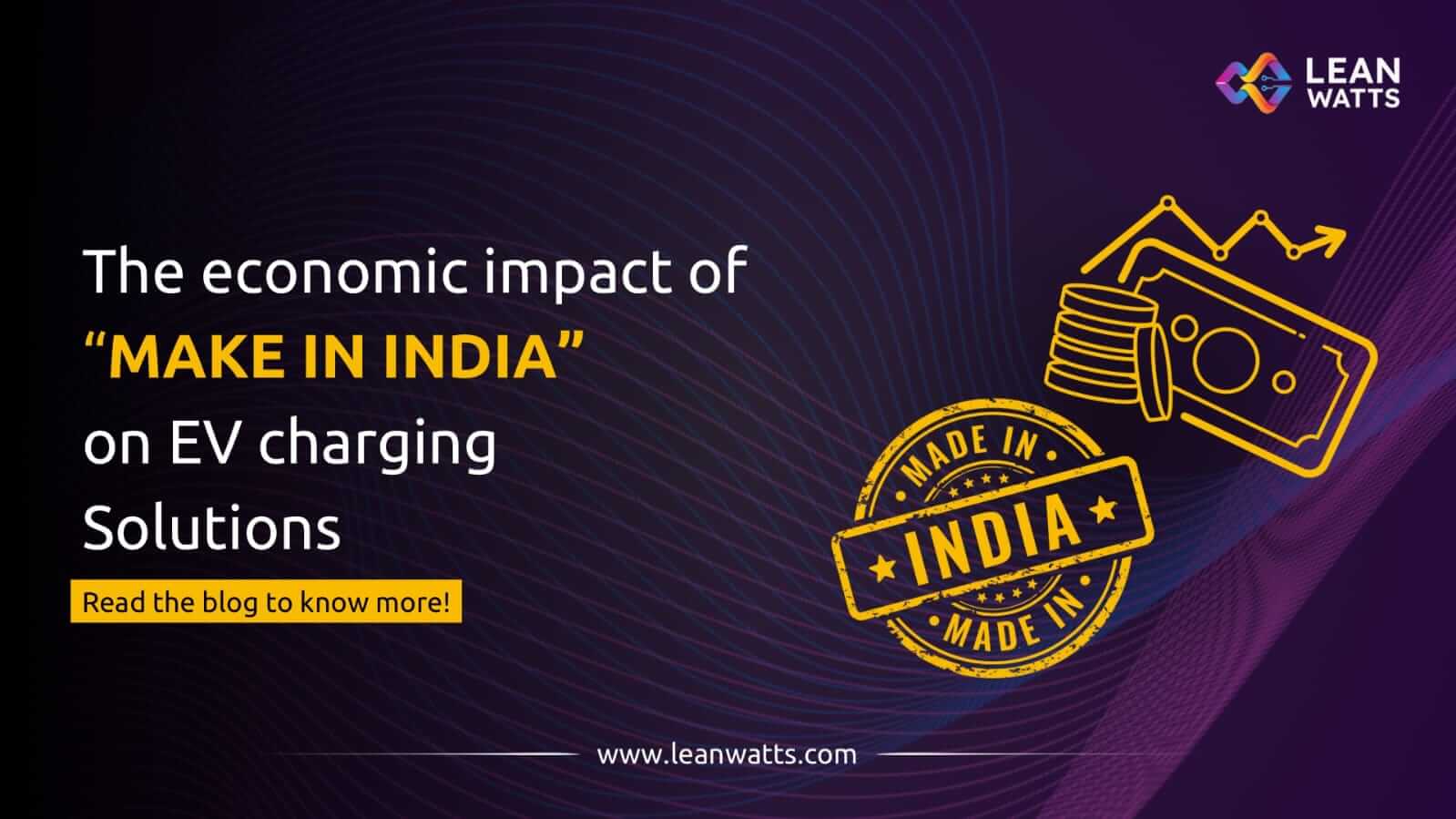
The global push towards electric vehicles (EVs) is undeniable, and as nations look to reduce their carbon footprints, the demand for EVs and their accompanying infrastructure is skyrocketing. Among the key players shaping this transition is India, with its ambitious ‘Make in India’ initiative. This policy, launched by the Indian government, aims to transform the country into a global manufacturing hub. But how does this initiative impact the EV industry, particularly in the realm of EV charging solutions? And what role does Leanwatts play in this evolving landscape?
Understanding ‘Make in India’
Launched in 2014, the ‘Make in India’ initiative was designed to encourage companies to manufacture their products in India, thereby boosting the country’s manufacturing sector. The initiative focuses on 25 sectors, with automobiles and automotive components being one of the primary areas of emphasis. The goal is not only to increase domestic manufacturing but also to create jobs, enhance skills, and make India a significant player in the global supply chain.
For the EV industry, ‘Make in India’ represents an opportunity to build a robust, self-reliant ecosystem that can support the burgeoning demand for electric vehicles. This includes everything from battery manufacturing to the development of EV chargers, all within India’s borders.
The Economic Impact on EV Charging Solutions
1. Cost-Effectiveness and Competitive Pricing: One of the most significant impacts of the ‘Make in India’ initiative on EV charging solutions is cost reduction. By manufacturing EV chargers locally, companies can avoid hefty import duties, reduce shipping costs, and benefit from government incentives. This not only makes the final product more affordable for consumers but also enhances the competitiveness of Indian-made EV chargers in the global market. For example, Leanwatts, a key player in the EV charging industry, leverages its local manufacturing and supply chain optimization capabilities to produce cost-effective chargers without compromising on quality. This cost advantage is passed on to businesses and end-users, making EV adoption more financially accessible.
2. Job Creation and Skill Development: The ‘Make in India’ initiative is also a significant driver of job creation in the EV sector. Manufacturing EV chargers locally requires a skilled workforce, from engineers and designers to assembly line workers. As companies expand their manufacturing operations, they contribute to job creation and the development of a skilled workforce that can further drive innovation in the EV industry. Additionally, the focus on local production encourages the development of specialized training programs and educational initiatives, ensuring that the workforce is equipped with the necessary skills to excel in this growing industry.
3. Strengthening the Supply Chain: A critical aspect of the ‘Make in India’ initiative is the emphasis on building a reliable and self-sufficient supply chain. For EV charging solutions, this means developing local suppliers for components such as power electronics, connectors, and other critical parts. By sourcing these components locally, companies can ensure a steady supply of high-quality materials, reduce lead times, and minimize the risk of supply chain disruptions. Moreover, a strong local supply chain reduces dependency on international suppliers, which is particularly important in the face of global uncertainties, such as trade tensions or pandemics. This self-reliance further strengthens India’s position as a leading manufacturer of EV charging solutions.
4. Innovation and Customization: The ‘Make in India’ initiative fosters a culture of innovation and customization. With local manufacturing, companies can work closely with customers to understand their unique needs and develop tailored solutions. Leanwatts, for instance, offers OEM customization options, allowing businesses to create EV chargers that perfectly match their specific requirements, whether it’s design, performance, or environmental considerations. This level of customization is only possible with a local manufacturing base that can quickly respond to customer feedback and incorporate changes without the delays associated with overseas production.
Leanwatts: Leading the Charge in ‘Make in India’
At Leanwatts, we are proud to be at the forefront of the ‘Make in India’ movement in the EV charging industry. Our commitment to local manufacturing enables us to offer cost-effective, high-quality EV charging solutions that meet the specific needs of our customers. From two- and three-wheeler chargers, and public charging use-cases to light electric 4-wheelers, our products are made in India.
We aim to build a fully integrated manufacturing unit, ensuring vertical integration that allows us to deliver large-scale production for our OEM customers. This vertical integration not only enhances our operational efficiency but also allows us to maintain strict quality control across all stages of production.
Moreover, by leveraging our in-house R&D lab, we continuously innovate and improve our products, ensuring they meet the highest standards of efficiency and reliability. This focus on innovation, combined with the benefits of local manufacturing, positions Leanwatts as a key player in the EV charging industry, both in India and globally.
Conclusion: The Road Ahead
The ‘Make in India’ initiative is more than just a policy; it’s a movement that is transforming the EV industry in India. For EV charging solutions, this means more affordable, reliable, and customized products that are built to meet the demands of a rapidly growing market.
As Leanwatts continues to expand its manufacturing capabilities, we remain committed to driving this transformation forward.
